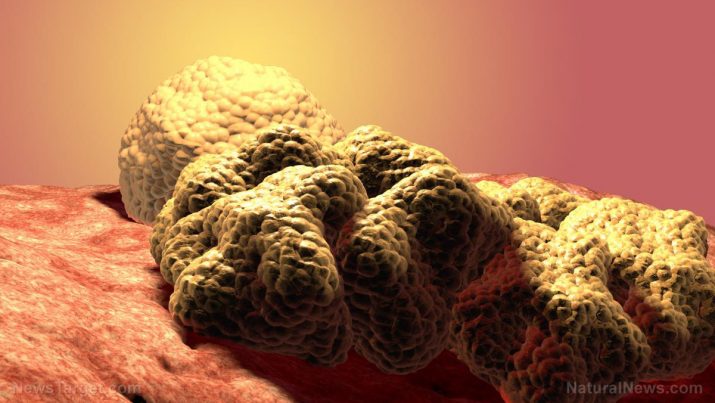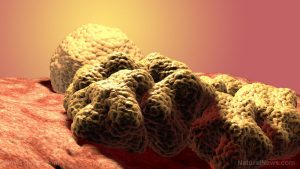
Aggressive fibromatosis – causes, side effects and treatments at NaturalPedia.com
Wednesday, January 03, 2018 by Ralph Flores
http://www.naturalpedia.com/aggressive-fibromatosis-causes-side-effects-and-treatments-at-naturalpedia-com.html

Aggressive fibromatosis (also called deep musculoaponeurotic fibromatosis or Desmoid tumors is a non-cancerous tumor that aggressively grows in an area of the body. The term “desmoid” comes from the Greek word “desmons,” which can mean tendon-like. An aggressive fibromatosis is not easily removed as it can attach itself to nearby organs or structures.
Cases of aggressive fibromatosis are rare, as they only account for 0.03 percent of all abnormal growth (neoplasm) and less than three percent of all soft tissue tumors. Studies put incidences of the condition at two to four per million every year. The tumors usually affect people ages 15 to 60 and are more common in women than men.
The exact reason for aggressive fibromatosis is still unclear. These types of tumors appear at irregular intervals or as part of a manifestation of a condition called familial adenomatous polyposis (FAP), a hereditary syndrome that, if left untreated, will ultimately result in colorectal cancer.

Known side effects of aggressive fibromatosis
Aggressive fibromatosis hits tissues that are elastic and move easily. Therefore, it may take some time before the tumor is discovered – sometimes after it has grown in size and has started to affect the surrounding tissue. While symptoms may vary from person to person, an onset of a desmoid tumor usually has the following:
- A painless lump or swelling
- A painful or sore feeling because of a compression of nerves and muscles
- Pain or a blockage in the bowel
- A noticeable limp or difficulty in using the legs, feet, arms, or hands
Body systems harmed by aggressive fibromatosis
The person’s muscular system could be adversely affected by aggressive fibromatosis as it tends to appear and develop in connective tissues and muscle linings. It is commonly found in the abdomen, the head and shoulder area, the back, and the extremities.
Food items that may prevent aggressive fibromatosis
The risk of developing aggressive fibromatosis may be reduced by using the following herbal treatments:
- Astragalus (Astragalus propinquus) – Also called Huáng Qí, this herb can protect the body’s immune system and aid in treating desmoid tumors.
- Butcher’s broom (Ruscus aculeatus) – The herb contains an active ingredient which has tumor-reducing properties.
- Goldenseal (Hydrastis canadensis) – As the herb contains anti-microbial and anti-cancer properties, it can be helpful in treating tumors.
- Red clover (Trifolium pratense) – Research has indicated that this plant has a potential in treating tumors and estrogen-driven cancers.
- Wormwood (Artemisia absinthium) – This herb is anti-microbial and anti-yeast and is reported to be effective in treating desmoid tumors.
- Saw palmetto (Serenoa repens) – The fruit of this plant, which can be found in Florida and the rest of the southeastern U.S., is used in a variety of treatments, and can relieve symptoms of desmoid tumors as well as others.
- Wheatgrass – This food is reported to be an excellent blood purifier and kidney-cleansing agent.
Treatments, management plans for aggressive fibromatosis
Healthcare professionals will normally recommend screening for sarcoma (cancer that occurs in connective tissue) when a person is initially diagnosed with aggressive fibromatosis. There are various procedures for treating desmoid tumors – including both surgical and non-surgical options. Some of the treatments include:
- Observation – Desmoid tumors show a variety of behaviors: While there are cases where significant growth is noted in the tumors, there are some that shrink without ever needing surgery.
- Surgery – While excision of the tumor is an option that may be suggested, a growing body of evidence has said that desmoid tumors have a high recurrence rate, even after surgery.
- Radiation Therapy – In this treatment, the tumor will be subjected to a dose of radiation to remove it. However, sarcoma experts do not recommend radiation therapy as this may develop an aggressive strain of cancer.
- Thermal ablation – This method uses heat or cold to eliminate the desmoid tumor. Needles are inserted into the tumor, and these will be used to either heat or freeze it.
Where to learn more
Summary
Aggressive fibromatosis is a benign tumor that normally develops in areas where there is soft tissue movement, such as connective tissues and muscles. While these are reported to be non-cancerous and rare, there are some cases that desmoid’s tumor can indicate a predisposition to cancer.
Symptoms of the condition include lumps or swelling in the area affected by the tumor. Once diagnosed, there are a variety of options to address it: these may include herb treatment or surgical procedures.
Sources include:
Tagged Under: Tags: aggressive fibromatosis





